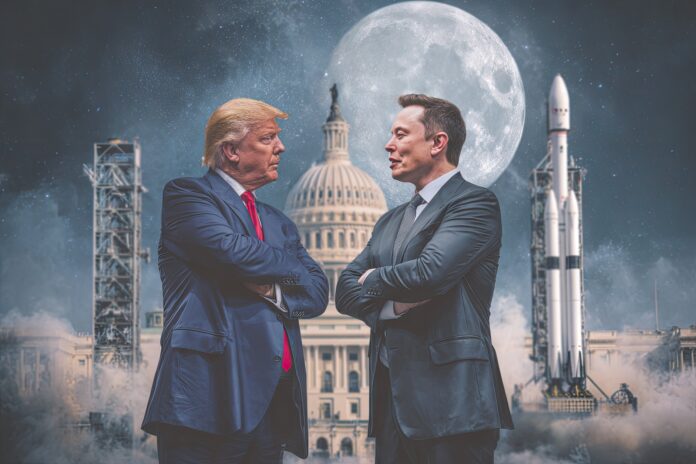Unraveling the Feud: Why the Trump-Musk Fight Matters
As President Donald Trump and SpaceX founder Elon Musk escalate their public spat, the fallout risks not only the future of NASA’s missions but also the very structure of U.S. commercial space efforts. Most importantly, this dispute could have ripple effects that extend throughout the cosmos.
The Political Meltdown and Its Immediate Threats
When Trump suggested cutting SpaceX’s government contracts, he directly jeopardized billions of dollars tied to NASA’s most critical programs. SpaceX currently provides the only U.S. crewed access to the International Space Station (ISS). Besides that, it dominates satellite launches, handling nearly 90% of all U.S. orbital payloads in the last quarter of 2023. Without SpaceX, alternatives for U.S. astronauts are scant—primarily relying on Russia’s aging Soyuz spacecraft, a clear strategic vulnerability.[2][4]
Impact on NASA’s Artemis Moon Program
The feud indirectly boosted Congressional support for returning to the Moon. Recently, Congress unveiled a $10 billion bill to shore up NASA’s Artemis program, countering White House proposals to slash lunar initiatives. This political attention resulted partly from the Trump-Musk social media showdown, with lawmakers eager to keep U.S. interests ahead of China in the lunar race.[1]
However, despite bipartisan urgency, the Artemis program relies heavily on private sector partners. SpaceX remains a linchpin, particularly for lunar landers. Therefore, any contract disruption or withdrawal could stall progress—at a time when momentum is crucial.
Commercial Space Rivals: Opportunity Amidst Chaos
As the Trump-Musk feud shakes investor confidence in SpaceX, competitors are seeing opportunity. Share prices for companies like EchoStar and AST SpaceMobile rose notably following the feud’s escalation. This market response signals that, while SpaceX’s dominance is profound, rivals stand ready to claim a larger share if uncertainty persists.[2]
National Security and Global Implications
The Trump-Musk feud places U.S. space leadership at risk. SpaceX not only underpins American access to space but also operates Starlink—a communications satellite network with significant geopolitical influence. The Starlink network already serves as a vital tool in global conflicts, offering broadband access in remote or war-torn regions. Musk’s unilateral control over Starlink’s engagement in international crises highlights both the network’s strategic importance and the dangers of concentrated market power.[4]
Should the U.S. Rethink Reliance on One Provider?
The Trump-Musk fight underscores a broader policy dilemma: America’s deep dependence on a single private space provider. This reliance makes the U.S. space program vulnerable to market and political shocks. If SpaceX halts Dragon flights, as Musk has threatened, ISS operations could grind to a halt. Therefore, policymakers may need to accelerate investments in alternative launch providers or even contemplate nationalizing key assets, such as SpaceX or Starlink, to safeguard national interests—a scenario now openly discussed in policy circles.[2][4]
The Road Ahead: Will the Trump-Musk Feud Derail U.S. Space Goals?
In conclusion, the Trump-Musk feud injects uncertainty into every aspect of U.S. space policy. Key lunar ambitions hinge on Artemis and its private partners; ISS operations hang by SpaceX’s thread; and America’s global space leadership is now subject to personal and political disputes. While the feud’s long-term outcome remains in flux, it exposes the urgent need for strategic diversification and robust policy protections. In an era where space is the new frontier of global influence, the stakes have never been higher.
References
- Politico: Over the moon: How the Trump-Musk feud helps the lunar mission
- GeekWire: How the Trump-Musk feud could affect SpaceX and its rivals
- UnHerd: Should Trump nationalise SpaceX and Starlink?
- Economic Times: From barbs to blows? 6 ways Trump can harm Musk



